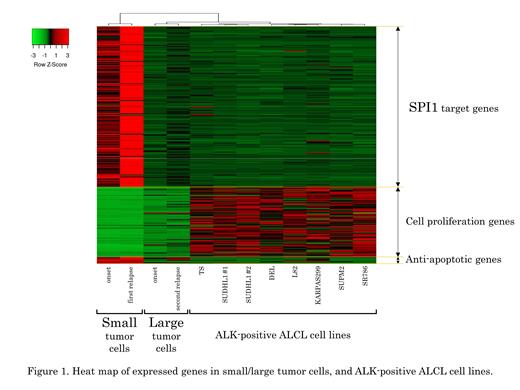Introduction
The small cell variant of anaplastic large cell lymphoma (SC-ALCL) is a subtype of anaplastic lymphoma kinase (ALK)-positive ALCL characterized by chemoresistance and poor prognosis, necessitating novel treatment strategies. Recent advances in targeted therapies have resulted in significant responses in various chemoresistant hematological malignancies. Therefore, understanding the underlying oncogenic mechanisms and identifying potential therapeutic targets are critical for overcoming SC-ALCL. Immunohistochemically, SC-ALCL comprises two distinct tumor cell populations: small tumor cells demonstrating negative to weak ALK and CD30 protein expression, and large tumor cells with robust expression of these proteins. We previously reported that small tumor cells display particular resistance to chemotherapy; however, the mechanisms underlying chemoresistance and the molecular characteristics of small tumor cells remain elusive. This study aimed to elucidate the molecular attributes of small tumor cells and pave the way for the development of innovative treatment approaches.
Methods
We investigated the characteristics of small tumor cells using patient blood samples diagnosed with SC-ALCL leukemic presentation and publicly available RNA-seq data from eight ALK-positive ALCL cell lines. Small and large tumor cells were separated from blood samples based on CD30 expression using CD30 - a phycoerythrin antibody and a magnetic bead separation kit. The presence of the NPM-ALK fusion gene was confirmed in both populations by PCR analysis. Bulk RNA-seq analysis was performed on four samples: small and large tumor cells at the onset and at the first (mainly occupied by small tumor cells) and second (mainly occupied by large tumor cells) relapses. Gene set enrichment analysis was used to identify gene expression patterns in small tumor cells. Signature genes of small tumor cells were identified by filtering with the following thresholds: false discovery rate-adjusted P-value <0.05, and fold-change >2 compared to large tumor cells. The transcription factors regulating the signature genes of small tumor cells were predicted using the g:Profiler software.
Result
Bulk RNA sequencing analysis of the four blood samples revealed that the SPI1 gene was significantly upregulated in small tumor cells compared to that in large tumor cells. SPI1 has emerged as the highest-scoring transcription factor, regulating the expression of 570 genes that characterize small tumor cells. Approximately 70% of these signature genes overlapped with the SPI1 target genes. Furthermore, gene set enrichment analysis revealed that small tumor cells display increased anti-apoptotic gene activity and decreased cell proliferation gene activity. These observations were validated by integrated gene expression analysis using publicly available RNA-seq data from eight ALK-positive ALCL cell lines (Figure 1). The study found high expression of SPI1 and SPI1 targeted genes in small tumor cells, accompanied by low expression of anti-apoptotic genes in ALK-positive ALCL cell lines, which were more analogous to large tumor cells than small tumor cells. Single-cell RNA-seq analysis validated the high expression of the SPI1 gene in small tumor cells.
To explore the mechanism regulating SPI1 gene expression, we examined DNA methylation patterns in the SPI1 promoter region using conventional bisulfite sequencing. Conventional bisulfite sequencing revealed a hypomethylated SPI1 promoter region in small tumor cells and a hypermethylated region in large tumor cells, potentially accounting for the differential SPI1 expression.
Conclusion
This study highlights SPI1gene as the master regulator determining the unique characteristics of small tumor cells in SC-ALCL. Furthermore, the regulation of SPI1 gene expression appeared to be mediated by DNA methylation patterns within the SPI1 promoter region. These findings pave the way for innovative treatment strategies for SC-ALCL such as SPI1 targeting therapy and methylation-based therapies, offering promising avenues for treating SC-ALCL.
Disclosures
No relevant conflicts of interest to declare.


This feature is available to Subscribers Only
Sign In or Create an Account Close Modal